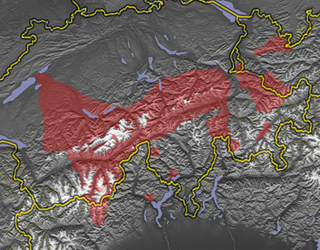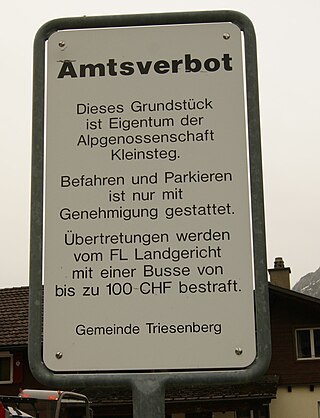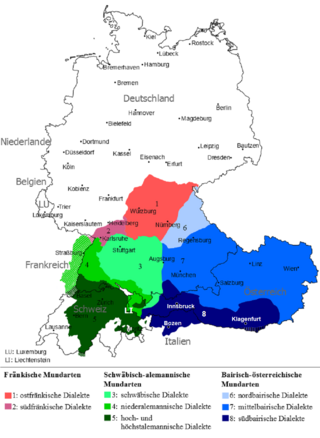The ISO 639-3 code gsw refers to the Alemannic varieties:
- Alsatian, Alemannic dialects spoken in most of Alsace
- Swiss German, Alemannic dialects spoken in the German-speaking part of Switzerland and some Alpine communities in Northern Italy
The ISO 639-3 code gsw refers to the Alemannic varieties:

German is a West Germanic language in the Indo-European language family, mainly spoken in Western and Central Europe. It is the most widely spoken and official or co-official language in Germany, Austria, Switzerland, Liechtenstein, and the Italian province of South Tyrol. It is also an official language of Luxembourg and Belgium, as well as a recognized national language in Namibia. There further exist notable German-speaking communities in France (Alsace), the Czech Republic, Poland, Slovakia, Denmark, Romania and Hungary (Sopron).
The High German languages, or simply High German – not to be confused with Standard High German which is commonly also called "High German" – comprise the varieties of German spoken south of the Benrath and Uerdingen isoglosses in central and southern Germany, Austria, Liechtenstein, Switzerland, Luxembourg, and eastern Belgium, as well as in neighbouring portions of France, Italy, the Czech Republic (Bohemia), and Poland. They are also spoken in diasporas in Romania, Russia, Canada, the United States, Brazil, Argentina, Mexico, Chile, and Namibia.
Swiss German is any of the Alemannic dialects spoken in the German-speaking part of Switzerland, and in some Alpine communities in Northern Italy bordering Switzerland. Occasionally, the Alemannic dialects spoken in other countries are grouped together with Swiss German as well, especially the dialects of Liechtenstein and Austrian Vorarlberg, which are closely associated to Switzerland's.
Alsatian is the group of Alemannic German dialects spoken in most of Alsace, a formerly disputed region in eastern France that has passed between French and German control five times since 1681.

Bavarian, alternately Austro-Bavarian, is a major group of Upper German varieties spoken in the south-east of the German language area, including the German state of Bavaria, most of Austria and the Italian region of South Tyrol. Prior to 1945, Bavarian was also prevalent in parts of the southern Sudetenland and western Hungary. Bavarian is spoken by approximately 12 million people in an area of around 125,000 square kilometres (48,000 sq mi), making it the largest of all German dialects. In 2008, 45 percent of Bavarians claimed to use only dialect in everyday communication.

Swabian is one of the dialect groups of Upper German, sometimes one of the dialect groups of Alemannic German, that belong to the High German dialect continuum. It is mainly spoken in Swabia, which is located in central and southeastern Baden-Württemberg and the southwest of Bavaria. Furthermore, Swabian German dialects are spoken by Caucasus Germans in Transcaucasia. The dialects of the Danube Swabian population of Hungary, the former Yugoslavia and Romania are only nominally Swabian and can be traced back not only to Swabian but also to Franconian, Bavarian and Hessian dialects, with locally varying degrees of influence of the initial dialects.
ALS is a chronic and fatal form of motor neuron disease; also known as Lou Gehrig's disease in the US, or Charcot's disease in the French-speaking world.

Alemannic, or rarely Alemannish, is a group of High German dialects. The name derives from the ancient Germanic tribal confederation known as the Alemanni.

The South Slavic languages are one of three branches of the Slavic languages. There are approximately 30 million speakers, mainly in the Balkans. These are separated geographically from speakers of the other two Slavic branches by a belt of German, Hungarian and Romanian speakers.
IK or Ik may refer to:

Highest Alemannic is a branch of Alemannic German and is often considered to be part of the German language, even though mutual intelligibility with Standard German and other non-Alemannic German dialects is very limited.

High Alemannic is a branch of Alemannic German spoken in the westernmost Austrian state of Vorarlberg and in Switzerland and Liechtenstein. Intelligibility of these dialects to non-Alemannic speakers tends to be limited.
GSW may refer to:
An IETF BCP 47 language tag is a standardized code that is used to identify human languages on the Internet. The tag structure has been standardized by the Internet Engineering Task Force (IETF) in Best Current Practice (BCP) 47; the subtags are maintained by the IANA Language Subtag Registry.

Liechtenstein's official language is German, and the principality is the smallest of the four countries in Europe populated by a majority of German speakers.

The languages of Austria include German, the official language and lingua franca; Austro-Bavarian, the main dialect outside Vorarlberg; Alemannic, the main dialect in Vorarlberg; and several minority languages.

The Alemannic Wikipedia is the Alemannic language edition of the Web-based free-content encyclopedia Wikipedia. The project was started on 13 November 2003, as an Alsatian language edition. A year later it was expanded to encompass all Alemannic dialects because of low activity in the first year. Since 2004 all Alemannic dialects are accepted on als:wp.

Upper German is a family of High German dialects spoken primarily in the southern German-speaking area.

The German-speaking part of Switzerland comprises about 65 percent of Switzerland.
Zul, ZUL or variations thereof may refer to: